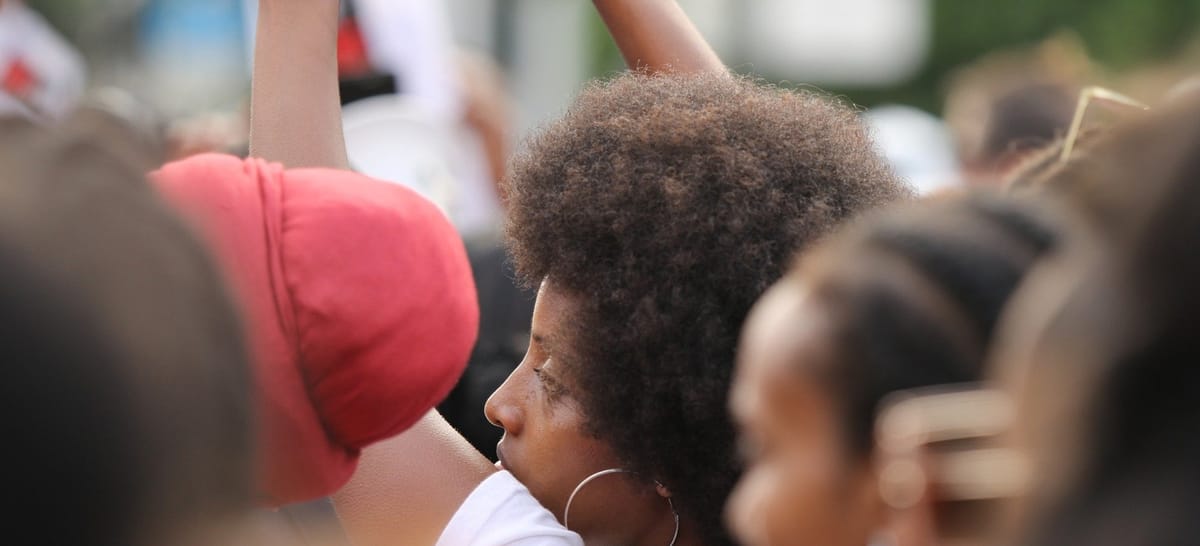Woke-Washing: When Anti-Racism and Sustainability Become a PR Stunt
What was the use of that black square if it wasn’t going to be followed by action?

Access the Audio Read version of this article directly on Spotify for Podcasters.
"Unless capitalism is truly dismantled to implement a more inclusive system, brands will continue on their unethical and hypocritical journey when it comes to sustainability and anti-racism."
In the course of the last twelve months, we’ve seen brands go green for climate change, rainbow for Pride, blue for the Sudanese Revolution and in June 2020, black for Black Lives Matter. Businesses and influencers alike posted a black square on their social media accounts in an effort to raise awareness for the movement, and a sign of support and allyship - whether it was going to be life-long support or completely performative allyship was going to clear only a few weeks later. Someone please explain to me - what was the use of that black square if it wasn’t going to be followed by action within? ‘Woke-washing’ has been used extensively over the Summer as a safety blanket to retain Black customers, but we see through those brands, and that black square absolutely doesn’t absolve them from criticism.
Did these brands and influencers really not know racism existed until the start of Summer 2020? That sudden mobilisation on social media made me think that way. Now, here’s an idea that could have been more efficient than a black square: instead of posting that black square (that was essentially warning followers they wouldn’t be posting on that day), brands could have put their money where their mouth was, and actually invest in initiatives empowering Black communities, and account for the wrongs within their own organisations. Here’s what I want to know: how many Black C-suite executives do they have that are not the Chief Diversity Officer or the ‘help’? Black customers have yet again been let down by brands who were all talk and no action, or even worse, discovered their favourite brands were simply mocking them.
Starting with PrettyLittleThing, the ever-insensitive brand, who posted an image (now deleted) featuring a black (literally) hand and a white hand. Not a shade that could depict the skin tone of a Black person, but jet black. What was that about? As per usual that brand was quick to jump on a social media bandwagon without even understanding the movement or the cause. We, Black customers knew it was just a marketing strategy (at best) - a failed one, might I add. Although Twitter users called for the cancellation of the brand, PrettyLittleThing is still alive and kicking today, selling cheap dresses on Black Friday, allegedly made by women in South Asia in pretty poor conditions. This is why ‘cancel culture’ doesn’t work in the real world unless you make choices with your wallet.

It’s just irritating - if not insulting - to see brands post squares without doing anything about their existing problems. Amazon themselves tweeted that they stand in solidarity with the Black Lives Matter movement, yet they sell facial recognition surveillance technology that has racial bias? All the while failing to pay their workers a decent wage and in my opinion, treating them like robots.
During the whole Black Lives Matter woke-washing campaign from some of the biggest companies in the world, the most hilarious one for me was TikTok - the same app, notorious for deleting posts from Black content creators, or content related to the Uyghur genocide. But what could I expect from a platform that is allegedly funded by the same Chinese government committing this genocide? On a more significant note, it shows that there is a price on Blackness, and that we are nothing more than marketing strategies or statistics that can be studied by the white board.
Notoriously, we’ve witnessed L’Oreal and the NFL speaking out while they are perpetrators of abuse against Black people and people of colour, especially the ones who dare take a stance against racism. Again, the irony of their marketing and PR stunt is not lost on Black people. In 2017, Munroe Bergdof was dropped by L’Oreal for speaking out against a white supremacist in Charlottesville, Virginia because her comments were “at odds” with the brand’s values. Bergdof rightfully called out L’Oreal in a tweet, exposing their performative activism and their false solidarity. Here’s what doesn’t make any sense to me: did L’Oreal really think we had forgotten? The beauty industry is famous for its hypocrisy when it comes to representation and diversity. As noted by Fast Company, Eyecue Insights even identified that dark skin tones only appeared in 13% of the 70 top beauty brands’ visuals over the past 3 years, but magically skyrocketed between May and July 2020, by a shocking 122%. By September, the majority of these brands had reverted back to business as usual, using lighter skinned models.

Almost no industry is exempt from performative activism - retail, beauty, entertainment, sports are all guilty of pretending they care without showing evidence. Where was this support when Colin Kaepernick was practically exiled from the NFL for taking a knee during the American National Anthem four years ago? After all Kaepernick was protesting against state sanctioned violence or as we know it, police brutality against African-Americans. In June 2020, the same NFL who didn’t seem to care about Black lives when Kaepernick stood for them began supporting the Black Lives movement, and unsurprisingly made a fake woke statement about the tragedies. Let’s remember that the NFL owners unanimously approved a national anthem policy requiring players to stand on the field but giving them the option to remain in the locker room if they wanted to take a political stand, instead of actually using their power to implement change.
The fight against racism isn’t the only bandwagon brands have jumped on last year, embracing lots of shiny adjectives like ‘sustainable’ and ‘ethical’. Fast fashion brands even encouraged us to say no to fast fashion. That sudden change in discourse is interesting, considering antiracism and sustainability go hand in hand, especially when you think of who actually makes the clothes. Some brands use sustainability as a nice little hat they put on to look good when convenient, without actually doing the work inside. Everlane, which claims radical transparency when it comes to their supply chain, has been called out countless times by former employees, consumers and industry experts on their social media and YouTube. One of them is the Ex Wives Club, as well as this insightful videobreaking down the brand’s alleged anti-Black behaviour, discriminatory workplace culture, union busting and greenwashing.

Last summer, the Ex Wives Club, made of former Black employees and employees of colour (as well as white allies) of Everlane shone a light on the hypocrisy behind the brand’s Black Lives Matter statement. In particular, what really got to me in Everlane’s statement was the audacity of a company that prides itself in being ethical, forgetting their ethics should be the same in everything they do.
This statement from the Ex Wives Club says it all: “Everlane broke us. Our spirit, our bodies, and our ideas were considered for their cache and cultural value. Our psyche was manipulated to fall in line with a greenwashed version of sustainability as we ourselves, worked unsustainably just to be seen and acknowledged for our contributions, while watching our white counterparts advance. We spoke up, we were silenced, and we are now passing on the burden of carrying these memories off to those who must take accountability.”
For years, Everlane’s radical transparency has turned into what appears to be convenient transparency, shining a light on certain parts of their supply chain but allegedly abusing its Black employees and employees of colour, and using green-washing tactics to appear sustainable. The marketing strategy behind green-washing seems beneficial to brands in the same way woke-washing does, to appear socially conscious and forward-thinking. Everlane isn’t the only brand that opted for poor decisions when it comes to sustainable transparency - Zara, H&M and many more have had their share of scandals. Despite heavy promotion around their ‘green’ lines, many retail giants still rely on underpaid labour by women in South Asia, and still use environmentally harmful fabrics such as cotton and triacetate in their clothing products (to name a few).
Meanwhile the effects of climate change are hitting the poorest populations the hardest, predominantly in Latin America, Africa, the Caribbean and Asia. Yet, these regions contribute the least to climate change. As many have noticed, sustainable fashion has also shown white women at the forefront of their marketing, when there are many Black and women of colour leading the sustainable fashion movements - Cynthia Dam, Brown Girl Green founder Kristy Drutman, The Eco Gal founder Lauren Ritchie, Aja Barber and Dominique Drakeford to only name a few. It must also be said that the eco-friendly movement has also been one dimensional for too long when it must be intersectional: it’s way too easy to shame working class people, Black and people of colour and plus sized women buying from fast fashion brands. Accessibility and affordability play a huge factor in buying choices.
All in all, it’s pretty clear that unless capitalism is truly dismantled to implement a more inclusive system instead, these brands will continue on their unethical and hypocritical journey when it comes to sustainability and anti-racism, getting a few lawsuits or cancellations here and there without real damage or long-term change - all the while getting away with non-apologies. But as consumers, we should still stay aware of who and where we’re buying from, keep calling out these brands and tell everyone we know. We can only hope the media will follow suit and help hit woke-washers where it hurts: their bank accounts. We all have a role to play, and it’s about doing our best and living by our values where possible, rather than buying them away.





